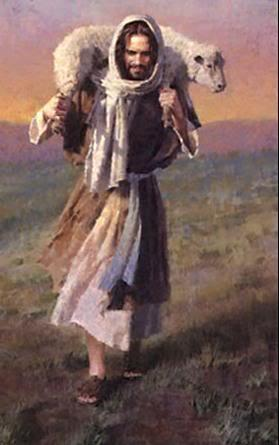The Lost Son
Luke 15:11–25
And He said, A certain man had two sons and the younger of them said to the father, Father, give me the part of the substance that is to be put upon me; and he apportioned1 to them his livelihood.
And not many days after, the younger son, gathering all together, went abroad into a distant country, and there wasted his substance, living recklessly. But when he had spent all, there arose a strong famine throughout that country, and he began to be lacking. And he went and joined himself to one of the citizens of that country; and he sent him into his fields to feed swine. And he longed to fill his belly from the husks which the swine ate; and no one gave to him. And when he came to himself he said, How many hirelings of my father have an excess of bread, but I perish with hunger! Standing up, I will go to my father, and will say to him, Father, I have sinned against heaven and before thee, and am no more worthy to be called thy son; make me as one of thy hirelings.
And he stood up and came to his father. And being yet a distance away, his father saw him and was moved with compassion2, and running, fell on his neck and kissed him. And the son said to him, Father, I have sinned against heaven and before thee, and am no more worthy to be called thy son.
But the father said to his servants, Bring out the chief robe and put it on him, and put a ring on his hand, and shoes on his feet.
And bring hither the fatted3 calf, and slaughter it, and let us eat and be merry. For this my son was dead, and is alive again; and was lost, and is found. And they began to be merry.
Returning to his father
AC 9391:6. The father said of the prodigal son who had returned repentant in heart, Bring forth the chief robe, and put it on him; and put a ring on his hand, and shoes on his feet; and bring the fatted calf, and kill it; and let us eat, and be glad (Luke 15:22, 23).
One who apprehends only the sense of the letter, will believe that nothing deeper is hidden here, when yet each particular enfolds heavenly things: as that they should put on him the chief robe; that they should put a ring on his hand, and shoes on his feet; and should bring the fatted calf, and kill it, so that they might eat and be glad. By the “prodigal son” are meant those who have been prodigal [or wasteful] of heavenly riches, which are the knowledges of good and truth. By his “return to his father,” and his confession that he was “not worthy to be called his son,” is signified repentance of heart and humiliation [or humbling himself]. By the “chief robe” which was to be put upon him are signified general truths... and by the “fatted calf” general goods corresponding to these truths.
TCR 510. I. Repentance is the first thing of the church in man. The communion called the church consists of all men in whom the church is, and the church enters into man when he is becoming regenerate, and everyone becomes regenerate by abstaining from the evils of sin, and shunning them as one would an infernal horde with torches in hand, endeavoring to overtake him and throw him upon a burning pyre.
There are many means by which man, as he progresses in his early years, is prepared for the church and introduced into it. But the means by which the church is established in man are acts of repentance.
Dwelling with swine
HH 488. Those that have been sordidly avaricious [extremely greedy] dwell in cells, and they love swinish filth and such stenches as are exhaled from undigested food in the stomach.
HH 430. The forms under which the lascivious delights of scortatory love are presented to view in hell are excrements and mire; the odors under which they are presented to the sensible perception there are stenches and noisome vapors; and the forms of beasts and birds under which they are there presented to view are swine, serpents, and birds called Ochim and Tziim.
1 The word here implies varying amounts to each.
2 Literally, “moved viscerally,” as in AE 622:10 and elsewhere
3 literally, “wheat-fed,” but “fatted” or “fattened” in AC 9391:6, AE 279:6
Questions and Comments
- We have been blessed with lots of truths from the Lord in the New Church. This parable seems particularly applicable when we find ourselves with heavenly riches which are described as “the knowledges of good and truth” (AC 9391:6). Are we using them wisely or recklessly?
- When we find ourselves in need of forgiveness, does it help to think of the Lord forgiving us like the father of the prodigal son?
- When we need to forgive someone, does it help to try to follow the example of the father of the prodigal son?
- Do you see in the parable how the prodigal son went through the process of repentance?
| previous |  |
next |
|---|


